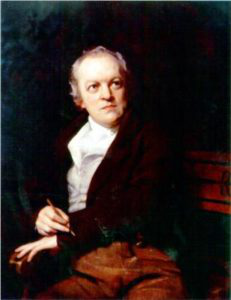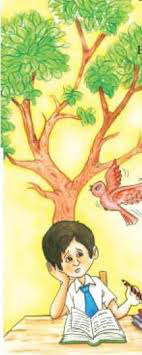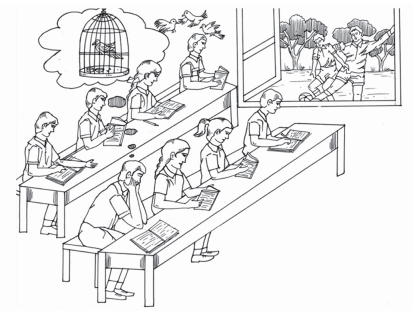THE SCHOOL BOY for Class 8 ENGLISH
THEME
The main theme is the sorrow that the boy feels having to go to school, when he wants to enjoy summer.
THEME
The main theme is the sorrow that the boy feels having to go to school, when he wants to enjoy summer.
EXPLANATION
Kavita ka main theme yeh hai ki ladka school jane ko mana karta hai aur dukh jatata hai, kyunki veh garmiyon ke mausam ka anand lena chata hai.
EXPLANATION
इस पाठ का मुख्य विषय यह है कि लड़का स्कूल जाने को मना करता है और दुःख जताता है, क्योंकि वह गर्मी के मौसम का आनंद लेना चाहता है।
ABOUT THE POET

William Blake was a 19th-century writer and artist who is regarded as a seminal figure of the Romantic Age. His writings have influenced countless writers and artists through the ages.
ABOUT THE POET

William Blake was a 19th-century writer and artist who is regarded as a seminal figure of the Romantic Age. His writings have influenced countless writers and artists through the ages.
EXPLANATION
William Blake 19th century ke ek writer aur artist the, jinhe romantic yug ka ek pramukh vyakti mana jata hai. Unke lekhan ne anginat writers aur artists ko prabhavit kiya tha.
EXPLANATION
विलियम ब्लेक 19 वीं सदी के एक लेखक और कलाकार थे, जिन्हें रोमांटिक युग का एक प्रमुख व्यक्ति माना जाता है। उनके लेखन ने अनगिनत लेखकों और कलाकारों को प्रभावित किया है।
STANZA 1
I love to rise in a summer morn,
When the birds sing on every tree,
The distant huntsman winds his horn
And the skylark sings with me.
O! what sweet company.
STANZA 1
I love to rise in a summer morn,
When the birds sing on every tree,
The distant huntsman winds his horn
And the skylark sings with me.
O! what sweet company.
IMPORTANT WORDS
Distant: far away in space or time, दूर
Huntsman: a person who hunts, शिकारी
Horn: a hard permanent outgrowth, often curved and pointed, found in pairs on the heads of cattle, सींग
Skylark: a common Eurasian and North African lark of farmland and open country, noted for its prolonged song given in hovering flight, चकवा (एक प्रकार का पक्षी)
IMPORTANT WORDS
Distant: far away in space or time, दूर
Huntsman: a person who hunts, शिकारी
Horn: a hard permanent outgrowth, often curved and pointed, found in pairs on the heads of cattle,सींग
Skylark: a common Eurasian and North African lark of farmland and open country, noted for its prolonged song given in hovering flight, चकवा
EXPLANATION
First stanza mein, speaker kehta hai ki ladka subah jaldi uthna pasand karta hai jab birds tree par gaana gaate hain. Jab shikhari ek doori par apna horn bajata hai to use vah aawaz pasand aati hai. Veh ek chote bhoore skylark ki company enjoy karta hai jo uske sath gaana gati hai.
EXPLANATION
शुरुआती पंक्तियों में, वक्ता, छोटा लड़का, एक गर्मियों की सुबह देखने के लिए जागने पर अपनी खुशी साझा करता है। वह पेड़ पर गाने वाले पक्षियों की मधुर ध्वनि की प्रशंसा करता है। वह माहौल को इतना खुशनुमा पाता है कि उसे लगता है कि रोशनदान (skylarks) उसके साथ गाता है। वह प्रकृति के इन सभी तत्वों के साथ को बहुत सुखदायक पाता है।
STANZA 2
But to go to school in a summer morn,
O! it drives all joy away,
Under a cruel eye outworn,
The little ones spend the day,
In sighing and dismay.
STANZA 2
But to go to school in a summer morn,
O! it drives all joy away,
Under a cruel eye outworn,
The little ones spend the day,
In sighing and dismay.
IMPORTANT WORDS
Cruel: wilfully causing pain or suffering to others, or feeling no concern about it, निर्दयी
Sighing: emit a long, deep audible breath expressing sadness, relief, tiredness, or similar, विलाप
Dismay: concern and distress caused by something unexpected, बेचैनी
IMPORTANT WORDS
Cruel: wilfully causing pain or suffering to others, or feeling no concern about it, निर्दयी
Sighing: emit a long, deep audible breath expressing sadness, relief, tiredness, or similar, विलाप
Dismay: concern and distress caused by something unexpected, बेचैनी
EXPLANATION
Kavi aage kehta hai ki ladke ko garmiyon ki subah school jana pasand nahi hai. Yah uske sare sukh aur anand ko cheen leta hai. Teachers students par kadi nazar rakhta hai aur unhe pura din dukh aur sankat main beetana padta hai.
EXPLANATION
इस तरह की सुहावनी सुबह में स्कूल जाने से लड़के को नफरत थी। इस बात ने उसे सभी ख़ुशियों से दूर कर दिया। वह एक सख्त शिक्षक की देखरेख में अपना दिन बिताने से नफरत करता था। लड़का ऐसा करने के लिए मजबूर होता है जो शिक्षक उससे अपेक्षा करता है। दूसरी ओर, वह गर्मियों की सुबह का आनंद लेना चाहता था।
STANZA 3

Ah! Then at times I drooping sit,
And spend many an anxious hour.
Nor in my book can I take delight,
Nor sit in learning’s bower,
Worn thro’ with the dreary shower.
STANZA 3

Ah! Then at times I drooping sit,
And spend many an anxious hour.
Nor in my book can I take delight,
Nor sit in learning’s bower,
Worn thro’ with the dreary shower.
IMPORTANT WORDS
Drooping: bend or hang downwards limply, लटकते
Anxious: feeling or showing worry, nervousness, or unease about something with an uncertain outcome, चिंतित
Delight: please (someone) greatly, आनंद
Bower: a pleasant shady place under trees or climbing plants in a garden or wood, कुंज
Dreary: depressingly dull and bleak or repetitive, सुनसान
Learning's Bower: a garden where the child can be taught in an interesting way, only if nature accompanies him instead of the school teacher, एक बगीचा जहाँ बच्चे को दिलचस्प तरीके से पढ़ाया जा सके, वह प्रकृति के साथ पढ़ाई कर सके
IMPORTANT WORDS
Drooping: bend or hang downwards limply, लटकते
Anxious: feeling or showing worry, nervousness, or unease about something with an uncertain outcome, चिंतित
Delight: please (someone) greatly, आनंद
Bower: a pleasant shady place under trees or climbing plants in a garden or wood, कुंज
Dreary: depressingly dull and bleak or repetitive, सुनसान
EXPLANATION
Third stanza mai, kavi elaborate karta hai ki kabhi kabhi ladka lambe samay tak apna sar neeche latkaye betha rehta hai. Use na to kitabein padhne main maza aata hai aur na hi use kuch bhi seekhne ke liye bethna pasand hai. Vah apne teachers ke lecture se bore ho jata hai.
EXPLANATION
लड़का अपने पहनावे को पाठकों के साथ साझा करता है। वह थक गया है और तहें दिल से निराश है। वह बड़ी बेचैनी और चिंता में स्कूल में अपना समय बिताता है। वह पढाई में कोई आनंद नहीं लेता है। स्कूल जाने और कुछ नया सीखने के बारे में कुछ भी मनोरंजक नहीं था क्योंकि सब कुछ बेहद सुस्त तरीके से सिखाया गया था। इसलिए, लड़का 'लर्निंग बोवर' (learning’s bower) और 'ड्रियरी शावर' (dreary shower) के बीच एक निश्चित संबंध बनाता है।
STANZA 4
How can the bird that is born for joy,
Sit in a cage and sing.
How can a child when fears annoy,
But droop his tender wing,
And forget his youthful spring.
STANZA 4
How can the bird that is born for joy,
Sit in a cage and sing.
How can a child when fears annoy,
But droop his tender wing,
And forget his youthful spring.
IMPORTANT WORDS
Cage: a structure of bars or wires in which birds or other animals are confined, पिंजरा
Annoy: make (someone) a little angry; irritate, परेशान
Tender: showing gentleness, kindness, and affection, कोमल
Youthful: young or seeming young, युवा
IMPORTANT WORDS
Cage: a structure of bars or wires in which birds or other animals are confined, पिंजरा
Annoy: make (someone) a little angry; irritate, परेशान
Tender: showing gentleness, kindness, and affection, निविदा
Youthful: young or seeming young, युवा
EXPLANATION
Kavi ladke ko ek bird se compare karta hai aur school ko ek cage se. Jaise bird cage mai nahi gaa sakti, vaise hi vah school mein apne bachpan ka anand nahi le sakta. Kavi kehta hai ki bache teachers se darte hain. Ladke ko lagta hai ki veh ek school mai kaidi hai. Jaise cage mein band bird spring ko enjoy nahi kar pata hai; issi tarah ladka bhi apni jawani ke dino ko enjoy nahi kar pata hain.
EXPLANATION
लड़का पक्षी की कल्पना करता है। एक पक्षी अपने गायन के माध्यम से आनंदित होने और खुशी फैलाने के लिए पैदा हुआ है। लेकिन, ऐसा वह तभी कर सकता है, जब वह स्वतंत्र हो और उसे बंदी न बनाया जाए। इसी तरह, बचपन में एक छोटा बच्चा अपने पँख फैलाना सीख रहा है या अपने आसपास की दुनिया के प्रति सचेत हो रहा है। किसी के लगातार डर या धमकी से उसका बचपन बर्बाद हो सकता है। एक पिंजरे के पक्षी की तरह, वह न तो खुश होना जानता था और न ही गाने गाना जानता था।
STANZA 5

O! Father and Mother, if buds are nip’d,
And blossoms blown away,
And if the tender plants are strip’d Of their joy in the springing day,
By sorrow and cares dismay.
STANZA 5

O! Father and Mother, if buds are nip’d,
And blossoms blown away,
And if the tender plants are strip’d Of their joy in the springing day,
By sorrow and cares dismay.
IMPORTANT WORDS
Nip’d: (nipped) ‘to nip something in the bud’ is to stop or destroy it at an early stage of its development, काटाना
Blossoms: a flower or a mass of flowers, especially on a tree or bush, फूल
Strip’d:(stripped) remove all coverings from, छीन लेना
Sorrow: a feeling of deep distress caused by loss, disappointment, or other misfortune suffered by oneself or others, शोक
IMPORTANT WORDS
Nip’d: (nipped) ‘to nip something in the bud’ is to stop or destroy it at an early stage of its development, काटाना
Blossoms: a flower or a mass of flowers, especially on a tree or bush, फूल
Strip’d:(stripped) remove all coverings from, छीन
Sorrow: a feeling of deep distress caused by loss, disappointment, or other misfortune suffered by oneself or others, शोक
EXPLANATION
Last stanza mai kavi mata pita se apne bacho ko pareshan na karne ki appeal karta hai. School jaane wale bache birds aur flowers ki tarah bahut sensitive aur delicate hote hai. Agar unpar zyda bhoj dala jayega, to vah dukhi hokar phool ke saman gir jayenge. Happy childhood ke bina ye sansar dukho se bhara hoga. Summer ke mausam mein koi joy nahi hoga, aur sadness ki wajah se kisi bhi pedh (tree) par koi bhi fruit ya flower nahi hoga.
EXPLANATION
पंक्ति में लड़का अपने माता-पिता को संबोधित करता है। वह उन्हें समझाने की कोशिश करता है कि अगर कलियों को काट दिया जाता, तो किसी को भी सुंदरता और सुगंध का पता नहीं चलता। इसी तरह, अगर पौधे नष्ट हो जाते हैं जब वे कोमल होते हैं, तो वसंत खुशी का अवसर नहीं होता। लड़का अपनी बात को व्यक्त करने के लिए ऐसी प्राकृतिक कल्पना के साथ अपने विकास की तुलना करता है।
STANZA 6
How shall the summer arise in joy,
Or the summer fruits appear?
STANZA 6
How shall the summer arise in joy,
Or the summer fruits appear?
IMPORTANT WORDS
Arise: get or stand up, उठता
Appear: come into sight; become visible or noticeable, especially without apparent cause, दिखाई
IMPORTANT WORDS
Arise: get or stand up, उठता
Appear: come into sight; become visible or noticeable, especially without apparent cause, दिखाई
EXPLANATION
Agar samay se pehle sab kuch nasth ho gaya, to kaliyan phoolon main nahi khilenge, pake fal dene ke liye podhe jeevit nahin honge, vasant ya garmi prasanta aur khushi se judi nahin hogi.
EXPLANATION
यदि समय से पहले सब कुछ नष्ट हो गया, तो कलियां फूलों में नहीं खिलेंगी, पके फल देने के लिए पौधे जीवित नहीं होंगे, वसंत या गर्मी प्रसन्नता और खुशी से जुडी नहीं होगी।
POETIC DEVICES
The poem 'The School Boy' uses powerful imagery, typical of romantic poems. The schoolboy is compared to a plant and a bird to show how he is wilted or feels caged. Metaphor and simile are also used by the poet: 'under the cruel eye outworn'. The use of alliteration gives it a lyrical quality: 'skylark sings'.
POETIC DEVICES
The poem 'The School Boy' uses powerful imagery, typical of romantic poems. The schoolboy is compared to a plant and a bird to show how he is wilted or feels caged. Metaphor and simile are also used by the poet: 'under the cruel eye outworn'. The use of alliteration gives it a lyrical quality: 'skylark sings'.
SUMMARY
SUMMARY
QUESTION ANSWERS:
1. Find three or four words/phrases in stanza 1 that reflect the child’s happiness and joy.
Ans: “I love to rise in the summer morn.”
The skylark sings with me.”
“O! What sweet company.’
2. In stanza 2, the mood changes. Which words/ phrases reflect the changed mood?
Ans: “O! It drives all joy away.”
“Under a cruel eye outworn.”
“Sighing and dismay.”
3. ‘A cruel eye outworn’ (stanza 2) refers to
(i) The classroom which is shabby/noisy.
(ii) The lesson which are difficult/uninteresting.
(iii) The dull/uninspiring life at school with lots of work and no play.
Mark the answer that you consider right.
Ans: (iii) the dull/uninspiring life at school with lots of work and no play.
4. ‘Nor sit in learning’s bower worn thro, with the dreary shower,
Which of the following is a close paraphrase of the lines above?
(i) Nor can I sit a roofless classroom when it is raining.
(ii) Nor can I learn anything at school thought teachers go on lecturing and explaining.
(iii) Nor can I sit in the school garden for fear of getting wet in the rain.
Ans: (ii) Nor can I learn anything at school though teachers go on lecturing and explaining.
QUESTION ANSWERS:
1. Find three or four words/phrases in stanza 1 that reflect the child’s happiness and joy.
Ans: “I love to rise in the summer morn.”
The skylark sings with me.”
“O! What sweet company.’
2. In stanza 2, the mood changes. Which words/ phrases reflect the changed mood?
Ans: “O! It drives all joy away.”
“Under a cruel eye outworn.”
“Sighing and dismay.”
3. ‘A cruel eye outworn’ (stanza 2) refers to
(i) The classroom which is shabby/noisy.
(ii) The lesson which are difficult/uninteresting.
(iii) The dull/uninspiring life at school with lots of work and no play.
Mark the answer that you consider right.
Ans: (iii) the dull/uninspiring life at school with lots of work and no play.
4. ‘Nor sit in learning’s bower worn thro, with the dreary shower,
Which of the following is a close paraphrase of the lines above?
(i) Nor can I sit a roofless classroom when it is raining.
(ii) Nor can I learn anything at school thought teachers go on lecturing and explaining.
(iii) Nor can I sit in the school garden for fear of getting wet in the rain.
Ans: (ii) Nor can I learn anything at school though teachers go on lecturing and explaining.
GLOSSARY
Distant: far away in space or time, दूर
Huntsman: a person who hunts, शिकारी
Horn: a hard permanent outgrowth, often curved and pointed, found in pairs on the heads of cattle,सींग
Skylark: a common Eurasian and North African lark of farmland and open country, noted for its prolonged song given in hovering flight, चकवा (एक प्रकार का पक्षी)
Cruel: wilfully causing pain or suffering to others, or feeling no concern about it, निर्दयी
Sighing: emit a long, deep audible breath expressing sadness, relief, tiredness, or similar, विलाप
Dismay: concern and distress caused by something unexpected, बेचैनी
Drooping: bend or hang downwards limply, लटकते
Anxious: feeling or showing worry, nervousness, or unease about something with an uncertain outcome, चिंतित
Delight: please (someone) greatly, आनंद
Bower: a pleasant shady place under trees or climbing plants in a garden or wood, कुंज
Dreary: depressingly dull and bleak or repetitive, सुनसान
Learning's Bower: a garden where the child can be taught in an interesting way, only if nature accompanies him instead of the school teacher, एक बगीचा जहाँ बच्चे को दिलचस्प तरीके से पढ़ाया जा सके, वह प्रकृति के साथ पढ़ाई कर सके
Cage: a structure of bars or wires in which birds or other animals are confined, पिंजरा
Annoy: make (someone) a little angry; irritate, परेशान
Tender: showing gentleness, kindness, and affection, कोमल
Youthful: young or seeming young, युवा
Nip’d: (nipped) ‘to nip something in the bud’ is to stop or destroy it at an early stage of its development, काटाना
Blossoms: a flower or a mass of flowers, especially on a tree or bush, फूल
Strip’d:(stripped) remove all coverings from, छीन लेना
Sorrow: a feeling of deep distress caused by loss, disappointment, or other misfortune suffered by oneself or others, शोक
Arise: get or stand up, उठता
Appear: come into sight; become visible or noticeable, especially without apparent cause, दिखाई
GLOSSARY
Distant: far away in space or time, दूर
Huntsman: a person who hunts, शिकारी
Horn: a hard permanent outgrowth, often curved and pointed, found in pairs on the heads of cattle,सींग
Skylark: a common Eurasian and North African lark of farmland and open country, noted for its prolonged song given in hovering flight, चकवा
Cruel: wilfully causing pain or suffering to others, or feeling no concern about it, निर्दयी
Sighing: emit a long, deep audible breath expressing sadness, relief, tiredness, or similar, विलाप
Dismay: concern and distress caused by something unexpected, बेचैनी
Drooping: bend or hang downwards limply, लटकते
Anxious: feeling or showing worry, nervousness, or unease about something with an uncertain outcome, चिंतित
Delight: please (someone) greatly, आनंद
Bower: a pleasant shady place under trees or climbing plants in a garden or wood, कुंज
Dreary: depressingly dull and bleak or repetitive, सुनसान
Cage: a structure of bars or wires in which birds or other animals are confined, पिंजरा
Annoy: make (someone) a little angry; irritate, परेशान
Tender: showing gentleness, kindness, and affection, निविदा
Youthful: young or seeming young, युवा
Nip’d: (nipped) ‘to nip something in the bud’ is to stop or destroy it at an early stage of its development, काटाना
Blossoms: a flower or a mass of flowers, especially on a tree or bush, फूल
Strip’d:(stripped) remove all coverings from, छीन
Sorrow: a feeling of deep distress caused by loss, disappointment, or other misfortune suffered by oneself or others, शोक
Arise: get or stand up, उठता
Appear: come into sight; become visible or noticeable, especially without apparent cause, दिखाई